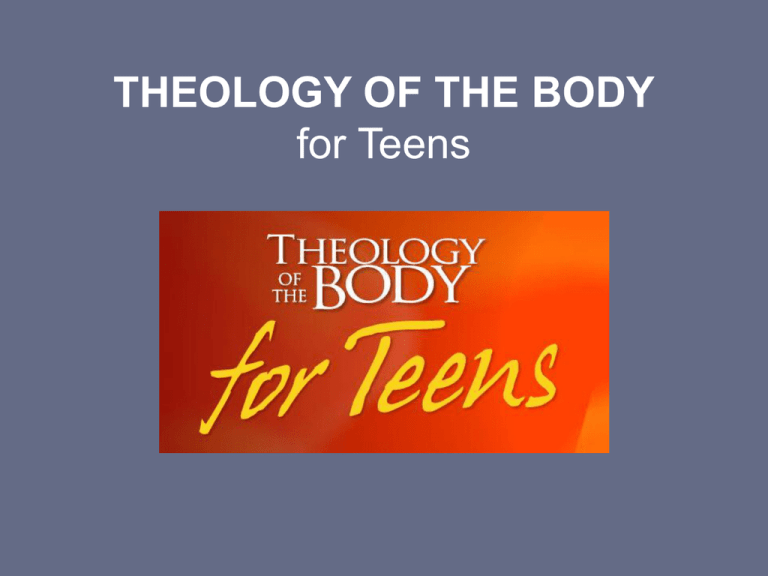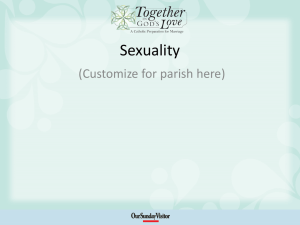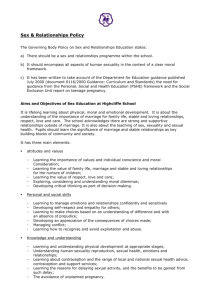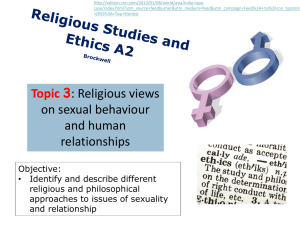
THEOLOGY OF THE BODY
for Teens
Chapter One
-Adam and Eve chose to disobey
God. They committed the first
sin. (Original Sin) Because of
this, we have a tendency to sin.
This is called concupiscence.
-Because of sexual liberation,
people feel that they can
choose to use their sexuality in
any way they choose.
- We have become
desensitized because of the
way the media deals with
sexuality (i.e.; frog in the pot,
page 9).
-Lust is the disordered desire for
inordinate enjoyment of sexual
pleasure. It is pleasure at the
expense of another. The other
person is used as an object.
Theology of the Body
-John Paul II’s 129 weekly
audience addresses
where he outlined the
Church’s teaching on
sexuality.
-Our bodies and sexual
desire show us the
meaning of our existence.
-It demonstrates why we are
here and our purpose.
Theology -The study of God. Theology of the body is the
study of God revealed through our bodies.
-A communion of persons is formed when two or more
persons give themselves to one another in love.
-God created humans to participate in heaven and on earth in
God’s love.
-The total gift of self can be seen in marriage or celibate life
(choosing to forego earthly marriage so as to devote oneself
to the marriage of Christ and the Church.)
-Our main goal as humans is
love – the decision to “will the
good of another person” (St.
Thomas Aquinas -- right).
-John Paul II’s vision of the
body as the visible sign of
that which is invisible.
-A sacrament makes a
spiritual reality visible; the
body makes our call to love
visible. This is called the
sacramentality of the body.
-Read “Digging Deeper”
pages 12 -13.
Chapter Two. Loved Defined : Giving vs. Using
Intro - “Hook Up World” pages 21 - 22.
Love - not merely a feeling. It is an act of
will that consists of
preferring the good of others to the
good of oneself.
- You can’t judge the value of love by
the intensity of the emotion.
Love and Responsibility – a book by John
Paul II that grew out of
a series of lectures that he gave from 1958
to 1959 as
Karol Wojtyla.
-He links love to the virtue of chastity –
“chastity is the
sure way to happiness”.
Chastity - the virtue that directs
our sexual desires and activities
toward the truth of love.
-Says “yes” to the demands of
love.
Virtue - the firm habit of doing what
is good.
Abstinence - not having sex.
Temperance - the virtue of
controlling and moderating our
desire for pleasure.
Personalistic Norm - a term used
by John Paul II to explain that
human persons deserve only
the best. We should never treat
anyone with less than love.
John Paul II described the three
aspects of love.
(a) love as attraction –
recognizing the good of another
person; seeing the inner beauty
of another person.
(b) love as desire – wanting a
good for yourself; desiring
goodness and happiness.
(c) love as goodwill - willing (or
desiring) the good of another
person. We also call this type of
love agape. Loving vs. Using
-Hate is not the opposite of love.
Using is the opposite of love.
Utilitarianism – using others for
one’s own gain.
Chapter Three. Naked Without Shame
Intro : The Two Bishops
Original Sin - the first human offense against God.
Original Man - the period of humanity before their first sin.
Original Solitude - Adam’s experience with the animals without Eve.
Adam realizes he is alone.
Original Nakedness - the peaceful state where Adam and Eve were naked
without shame. Lust does not exist, and desire was pure.
Original Innocence - prior to the first sin, the hearts, mind, and bodies are
perfectly innocent.
Nuptial Meaning of the Body - our bodies reveal its own meaning
in which it becomes a gift.
Original Unity - the initial experience of perfect unity as they live
in
communion with each other.
God’s love can be described as:
Free - given to us without limit.
Total - God’s love is complete, and He gives all to us.
Faithful - God never abandons us and never stops loving us.
Fruitful - God’s love brings us life. Jesus died for us, so that
we could have new life.
Historical Man - period that begins with original sin and ends
when Christ returns.
Chapter Four. Hope and Redemption in Christ
God desires us to be with Him in heaven.
Jesus is our invitation and ticket to enter
His kingdom. By His sacrifice, we may
enjoy a union with Him in heaven – the
marriage of perfect love between Christ
and His Church.
Eschatological Man - is the final stage of
perfection achieved in the
Resurrection at the end of time where we
will be freed
from any tensions between the flesh and
spirit.
Read page 52 “The Room”.
Because of our tendency to sin, God gives us
help to overcome it. He
sends His Son to redeem us (our bodies
and our desires).
In eternity, we will experience the fullness of Christ’s redemption;
and when we are rejoined with our bodies, they will be our
glorified bodies.
The nuptial meaning of the body not only points toward our union
on earth, but to our heavenly marriage.
-Eschatological man will be married, but not on earth. We will
be married as members of the Church, the bride of Christ.
-There will not be physical, sexual relationships in heaven, but
we will retain our gender (a difference between the sexes).
-Preparation for this marriage begins now. Courtship is a time to
get to know the person you will marry. Our earthly life allows
us to learn about Jesus.
“The hope of every day” - according to John Paul II, is that Jesus offers us grace
to begin anew now and allows us to enter communion with Him in heaven.
Chapter Five. Truth and Freedom
Freedom - the ability and desire to choose the good and accept the
responsibilities of authentic love.
-Real freedom is experienced when we remember who we are and
how we are called to live.
Read “Free and Empty “ pages 68 and 69.
In order to understand freedom, we need to find the objective truth (a
reality
that cannot be changed ourselves) vs. subjective truth (someone’s
opinion).
We must deal with internal constraints (distractions or disordered
desires within us that steer us away from choosing the good) or
external constraints (the laws of God or society that protect us from
abusing our free will and hurting ourselves or others).
God gives us the gift of
free will - it allows us
to choose between
good and evil. We
choose our own
destiny.
St. Irenaeus - “Man is
rational and therefore
like God; he is
created with free will
and is master over his
acts.”
Chapter Six. Language of the Body
Read “A Deceptive Appetite” pages 82 and
83.
John Paul II taught that the language of the
body is not only a language of love, but a
language of divine love.
Our body makes a promise to another during
sex. It requires the total commitment of
marriage. The language of sex is only
true when it speaks of marital love.
Sex makes a gift of one person to another.
Lies of the body include: fornication,
contraception, and pornography.
Fornication - is sex outside of marriage. The
“hooking up” culture gives no promise of a
long commitment.
Contraception - every action before, during, or after sexual intercourse
that impedes the procreative potential. Contraception says
“I refuse to give you all of myself. I won’t give you my fertility”.
Contraception - is a barrier between a couple’s full love and gifts of self.
Pornography - the sexually explicit depiction of persons, in words or
images, created in order to cause the arousal of lust on the part of
the observer.
-No self-giving in pornography.
-The body is separated from the person.
-Makes us enter the world of lust and fantasy.
Page 91. Live It Out : Overcoming Lust.
Living a pure life.
(1) Remove the
temptation.
(2) Frequent the
sacraments.
(3) Keep busy. St.
Francis said, “Always be
doing something
worthwhile; then, the devil
will always find you busy”.
(4) Pray for the
redemption of your
desires.
Chapter Seven -- Free, Total, Fruitful, and Faithful
Spousal Vows of Love vs. Christ’s Example of This
Love
-Will you accept children lovingly
from God and bring them up
according to the laws of
Christ?
-Have you come here freely to
give yourselves in marriage?
-Will you love and honor each
other as man and wife for the
rest of your lives?
-Have you come here without
reservation (withholding
nothing)?
“I came that they might have life
and have it more abundantly.”
“I lay down My life. . .No one takes
it from Me.”
“I am with you always until the
close of the age.”
“Greater love has no man than this,
that a
man lay down his life for his
friends.”
Free - Jesus modeled for us, through His
passion and death, what free love
really means.
Total - As Jesus gave us all that He had,
He shows us what total love really
looks like.
Faithful - Jesus was faithful to His
Father’s will and faithful to each one of
us.
Fruitful - There was never a more fruitful
life and death than that of Jesus
Christ.
His death bring new life to humanity.
Understanding Homosexuality
Natural law - governs the behavior of man
and written into the very nature of
every human being.
• Natural law helps us to
look at the body and see
that it was created for
certain functions.
• The natural design of the
body demonstrates its
love giving and life-giving
purpose.
• Our sexual organs do not
have the same clear
purpose when matched
up with a person of the
same sex.
Chapter 8-Marriage
Page 112 &113-The story David and Brenda
Pope John Paul II insisted that the spousal analogy of Christ's love for the
Church is the only key to understanding the Sacramentality of marriage.
Marriage is an amazing opportunity for spouses to image agape love (God’s
unconditional love) for each other through mutual respect and total self
donation.
John Paul II called marriage the “primordial Sacrament” or the first sacrament.
Too many relationships are built on infatuation. This fades where some stress
of suffering comes along, you are left with the real person that you have chosen
to marry. At this point, love is tested, and its value comes to light.
Pope John Paul II says at this point if a couple's love is a true gift to self, it will
not only survive but grow stronger and sink deeper roots.
• Humanae Vitae -- Pope Paul VI’s encyclical on the Church’s
teaching on procreation and the meaning and purpose of the sexual
gift.
• In this encyclical, he offered reasons for the immorality of
contraception and predicted what would take place if it were to
become common in society. He warned about the increase in marital
infidelity and a general lowering of the morality of the youth.
• The pope had witnessed the acceptance of contraception within
Christianity (the Anglican faith) and knew society would soon also
accept it. Many leaders in society including Gandhi and the early
feminist leaders had also warned of the negative consequences of
contraception.
• The Church urges the use of Natural Family Planning (referring to
the various effective, natural, and moral methods for achieving or
postponing pregnancy.)
• Oxytocin= a hormone
released in the
pituitary gland of the
brain during childbirth,
breast-feeding and in
intercourse, causing
emotional bonding
between persons in
whom it is released.
This chemical offers
proof that men and
women are physically
created to be in
mutually exclusive
relationships.
Chapter 9- Celibacy and Religious life
Celibacy is a special vocation to which God calls on people to live as
their way to holiness.
God calls every human being to live out their lives through their
vocation or special calling.
Celibacy is a free choice to renounce marital communion with a spouse
in order to serve God and the Church more fully. The Church forces no
one to be celibate. In the case of the priesthood, the Church chooses
her priests from among the men who have discerned and freely chosen
celibacy as their life’s location.
Celibacy does not reject sexuality. Those who enter the religious life as
priests, brothers, sisters, etc. are a foreshadowing of how all of us will
live in the heavenly kingdom. Celibacy is a witness to the fact that there
is a greater joy (that is heaven) than the joys of this world. It shows the
true meaning of our sexuality, the giving of ourselves to God.
• St. Joseph, the most chaste spouse
of the Blessed Virgin Mary, was so
enraptured by the love of God that
no earthly love could possibly
compare. His chastity allowed him
to more perfectly get himself to God.
Men and the priesthood1. The priest acts in persona Christi, as
they provide us with the sacraments
and other ecclesiological services.
2. Since God created marriage as the
union between a man and a woman,
only a man can act in the person of
Christ as a groom who was meant to
marry his bride, the Church.
3. The priesthood is a spiritual
fatherhood.
Why aren't priests married?
1. Since the priest acts in persona
Christi and marries the Bride of
Christ, the Church, he should give
himself completely to her.
2. The Church teaches that
celibacy is an objectively higher
calling than marriage, because it
more directly reflects the heavenly
marriage of the Church and the
Lamb of God.
Celibacy is considered to be an
eschatological sign because it
foreshadows what heaven will be
like.
Chapter 10-Finding Your Vocation.
Some obstacles to finding God1. Our lives are too noisy. We wake up to music, watch television, listen to the
radio and never give ourselves a chance to be still and quiet in prayer. As John
Paul II said, “Above all, create silence in your interior. Let that ardent desire to
see God rise from the depths of your hearts, a desire that at times is suffocated
by the noise of the world and the seduction of pleasures.”
2. We are too busy. We seldom leave room to pray. Like any good relationship,
our relationship with God will deepen according to how much effort we put into it.
3. Lack of trust. We don’t trust God. We don't trust others. We're afraid to hear
what God has to say to us. He might be asking us to do something or let go of
something that is very difficult.
4. Apathy. Sometimes we don't seem to care what God has to say. We put faith
on the back burner and contemplate this relationship it only in times of trouble
and difficulty.
5. Blurry vision. Society and an obscured morality make it difficult for us to see
things clearly. We let our sins and a corrupt world point us in the wrong direction.
Finding the right path in life.
1. Pray. Spend time getting to
know and love God through prayer,
the sacraments, etc.
2. Ask yourself if your decisions
are in line with what God teaches
and what He wants of you.
3. Give advice. Seek the wisdom
of those smarter than you, have
lived life and understand the
correct path to choose.
4. Practice reconciliation. Seek
forgiveness in your own life and do
not be afraid to forgive others.
5. Listen to your heart. God often
speaks to us through a conscience
and through our intuition.
Chapter 11 –
Dating with Purity and Purpose.
The purpose of dating.
1. The ultimate purpose of dating is to find a spouse.
2. To discover the qualities that we like in other people.
The basis of every relationship with the opposite sex
should be friendship. Too many relationships today are
built on sexual attraction and provide a weak foundation
for a true relationship.
Courting teaches you to be friends with a particular
person before jumping into a romantic relationship.
Some practical advice for dating.
1. Avoid impure relationships before they begin.
Stay away from the hooking up mentality that treats
the relationships with the opposite sex is pure
recreation.
2. Know your boundaries before you attempted to
make sure your date knows them as well.
3. Choose friends who elevate you morally rather
than drag you down.
4. Avoid impure images, music, magazines that
corrupt you morally.
5. Think about your future and the man or woman
who you want to be with for the rest of your life.
Think about the consequences of your actions and
how they might affect your marriage someday.








